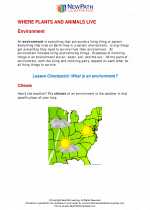The Water Cycle
The water cycle, also known as the hydrologic cycle, describes the continuous movement of water on, above, and below the surface of the Earth. This cycle is crucial for maintaining life on our planet and involves processes such as evaporation, condensation, precipitation, and runoff.
Key Processes of the Water Cycle
- Evaporation: This is the process by which water is heated by the sun and changes from a liquid to a vapor, rising into the atmosphere.
- Condensation: As the water vapor rises, it cools and condenses into tiny water droplets, forming clouds.
- Precipitation: When the water droplets in the clouds become too heavy, they fall to the Earth's surface as rain, snow, sleet, or hail.
- Runoff: Some of the precipitation flows over the land, eventually reaching rivers, lakes, and oceans.
- Transpiration: This process occurs in plants, where water is absorbed by the roots and then released into the atmosphere through the leaves.
Study Guide
Here are some key concepts and questions to help you understand the water cycle:
Concepts to Understand
- The sources of water for the water cycle
- The role of the sun in the water cycle
- The different forms of precipitation
- The importance of the water cycle for ecosystems and human activities
Questions to Consider
- What are the main processes involved in the water cycle?
- How does water move from one part of the cycle to another?
- Why is the water cycle important for maintaining life on Earth?
- What are some human activities that can impact the water cycle?
Understanding the water cycle is essential for comprehending Earth's interconnected systems and the impact of human activities on the environment. It's also important for understanding weather patterns and the distribution of water resources around the world.
By studying the water cycle, you'll gain a deeper appreciation for the complexities of the natural world and the importance of preserving water resources for future generations.
.◂Science Worksheets and Study Guides Third Grade. Where plants and animals live

 Worksheet/Answer key
Worksheet/Answer key
 Worksheet/Answer key
Worksheet/Answer key
 Worksheet/Answer key
Worksheet/Answer key
 Vocabulary/Answer key
Vocabulary/Answer key
 Vocabulary/Answer key
Vocabulary/Answer key
